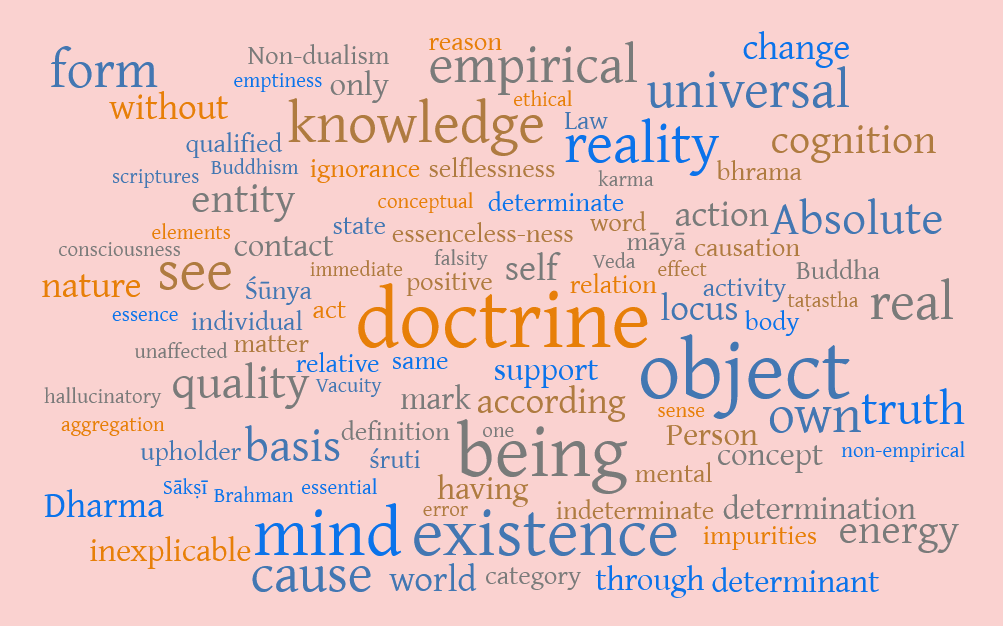absolute -- That which is unconditioned, uncaused, not limited by anything outside itself.
aesthetics -- The philosophical category concerned with values other than moral; e.g., art, beauty, creativity, etc.
agnosticism -- Literally, "without knowledge." Usually used to refer to someone who does not know if God exists. A "hard" agnostic says that he does not know if God exists, no one else knows if God exists, and it is impossible to know if God exists. A "soft" agnostic says that he does not know if God exists, someone may know if God exists, and it might be possible to know if God exists.
animism -- The world view that says all things, animate or inanimate, possess souls or spirits.
apologetics -- The defense of a position, usually of a world view, as to its truthfulness, its correspondence to reality, its factualness. Christian apologetics (see 1 Peter 3:15) argues for the truthfulness of Christianity through argumentation, evidence, and appeal to a priori knowledge.
a posteriori -- An argument proceeding from sense experience.
a priori -- An argument based on evidence obtained prior to and independent of sense experience.
atheism -- The world view that says that God does not exist, or that embraces a world view without God, or that says that God is irrelevant to human life.
axiology -- That branch of philosophical inquiry regarding values, usually divided into the two categories of aesthetics and ethics.
axiom -- A basic principle that cannot be deduced from other principles but is the starting point from which other statements are derived or deduced.
being -- Any existing thing or object, material or immaterial. Often used to refer to that which is not subject to change.
category -- That which must be assumed for the existence of any realm of being or discourse; i.e., space is a necessary assumption for the existence of material substance. A fundamental principle that is implied or presupposed for all experience; also used informally to refer to a specific set or group.
cause -- That which is responsible for any change, motion, or action; the necessary antecedent of any effect, or, in science, the invariable antecedent of a given event. In philosophy, the ultimate power that produces the being of anything.
coherence -- A theory of truth or knowledge; the idea that that which is symmetrically consistent, internally consistent, and eternally adequate to the facts is true.
concept -- An object of the mind or universal; a universal object or category of the mind independent of sensation.
consciousness -- A term difficult to define, but, in general, said to be all the processes of thought which go to make up the experience of a rational being or self.
contingency -- From the Latin "to touch on all sides," (1) that which may be or may not be as a (sufficient, but not necessary) consequence of something else. (Example: His nomination as MVP is contingent on his being hired to play on a team. However, even if he is hired, he may not be nominated as MVP.); (2) Dependency on something else for its existence, truthfulness, accuracy, relationship, or enactment. (Example: God is the only non-contingent Being in existence.)
cosmological argument -- An argument for the existence of God that is based on observation of nature. It attempts to derive the existence of God from such observation.
deduction -- The type of argument or inference whereby the conclusion is claimed necessarily to follow from the premise.
definition -- That which distinguishes something (object, substance, concept, idea, etc.) from everything else.
deism -- The world view that God is only transcendent (beyond) the world but not immanent (acting) in the world.
dualism -- The distinction of two essential and co-existing components in one system, i.e., in religious world views, the belief that God is composed of two opposing parts that exist eternally and together are the constituents of God. ("God contains both positive and negative forces, good and evil, male and female, spirit and matter, etc.")
determinism -- The theory that the universe is so constructed that everything occurs as the inevitable consequence of antecedent causes.
empiricism -- The theory that our only source of knowledge about reality is experience, specifically, sense experience.
epistemology -- The theory of knowledge; how we know we know; the study and acquisition of knowledge.
equivocal -- Using the same term with two different meanings in the same argument or presentation; a word that admits of more than one meaning before its meaning become univocal by a specific context or use.
essence -- That which makes an object or being what it is in itself; the nature rather than the existence of anything.
ethics -- The branch of axiology concerned with moral values; the good, the right, the noble. What one "should" or "ought" to do.
existence -- The state of being actual or real (but not necessarily material) as opposed to possible or imaginary; that which has a definable place in reality.
experience -- In philosophy, usually equated with consciousness; it is used both of perception and organized and interpreted data according to the categories of thought.
fallacy -- An error in reasoning that makes it impossible to establish the conclusion in question on the given premise; a logical mistake that makes deductive arguments invalid. "Informal fallacies" generally describe a stated inference that frequently (but not always) is not true. Example: Guilt by association -- "He hangs out with bad kids, therefore he must be a bad kid." Maybe so, but he might hang out with them because he's an undercover vice cop, or a Christian youth worker, etc.
hypothesis -- A statement proposed as true or accurate before actual testing of the claim is made (logically or empirically); a theory.
idea -- A universal or eternally real object, according to Plato; A synonym for the Absolute, according to Hegel; A perception in consciousness of an object, generally.
idealism -- The theory that reality is of the nature of mind or consciousness (non-material). There are many types of idealism, but objective (usu. pantheistic) idealism and subjective (usu. many minds, one Supreme Mind) idealism are the two major categories.
immanent -- That which dwells in or is present with, such as the transcendent God is immanent in his communication and acts in the created order.
indeterminism -- The theory that the universe is constituted in such a way that some events are not the inevitable consequence of antecedent (prior) events.
induction -- The process of arriving at generalizations (universals) by an observation of facts (particulars). Sometimes called scientific or empirical logic.
inference -- A proposition that follows logically from other statements; to draw an implication.
infinite -- That which is without limit, without boundaries; in time, that which is unending.
judgment -- The activity of the mind that describes or interprets reality, including, but not limited to, concepts, true and false empirical evidence, and valid and invalid logical arguments.
knowledge -- A statement that can be affirmed both by empirical facts and by valid logic; Sometimes a statement that by its nature can be and is affirmed by valid logic, not necessarily by empirical observation (one's own existence, for example).
logic -- A study of the principles of thought by which one may distinguish correct from incorrect reasoning. Deductive logic argues from the general to the specific; it focuses on the correct form of an argument, deducing the validity of propositions and conclusions. Inductive logic argues from the specific to the general; it focuses on (usually) empirical evidence and/or information and the subsequent certainty or probability of the conclusion. Logic, properly applied in conjunction with sufficient evidence and/or information, should enable one to obtain knowledge of reality, truth in a given instance.
logical positivism -- see empiricism.
materialism -- The metaphysical theory that views reality as only matter and its determinations; naturalism; physicalism.
matter -- That which occupies space; that which has extension; that which can be discovered or discerned empirically, or with the senses.
metaphysics -- Used to describe Aristotle's work by the Greek philosopher Andronicus of Rhodes (~ 70 BC) as the Greek ta meta ta physika, meaning "the things after the physics." It is generally considered to be synonymous with ontology, and is concerned with the study of the nature and structure of "being," or reality.
mind -- That which knows, perceives, understands, thinks, imagines, conceives, reasons, and wills. To a materialist, mind is either synonymous with brain, or is produced by brain. To a critical realist, mind is an immaterial entity or substance with personal consciousness.
monism -- (1) The theory that all reality is one, or of one substance; that there is no qualitative difference between the stuff of the universe, the stuff of humans, or the stuff of reality. (2) One principle or nature is all that it takes to explain everything in reality. Primary monisms are idealism and materialism. (3) In epistemology, the theory that the idea and the object known are one in the cognitive act.
mysticism -- The belief that direct knowledge of God may be achieved by the human apart from both empirical experience and logical revelation; such knowledge generally is incommunicable.
naturalism -- see materialism.
necessary -- (1) In logic, any statement whose denial would involve a contradiction. (2) In ontology, the quality of a being that is eternal and needs nothing else to exist or continue to exist.
nominalism -- The theory that universals are not real but only class names.
noumenon -- According to Kant, that which exists objectively, as opposed to that which our perception leads us to think exists (the phenomenon, or the "thing-as-it-is-to-me" rather than the "thing-as-it-is."); an object of thought.
nous -- Variously, mind, reason, spirit, intellect. Sometimes informally as creative inspiration.
objective -- That which relates to objects in reality that are supposedly the same for all experiences.
ontological argument -- The classic argument for the existence of God by demonstrating that the denial of the proposition "God exists," is self-contradictory; The argument that the essence of God demands his existence; The argument for the existence of God based on the aprehension and understanding of what exists.
ontology -- see metaphysics.
panentheism -- The world view that everything exists in God, but God is somehow greater than the totality of reality; that God relates to the world as a hand relates to a glove, or as a soul relates to a body. Contemporary panentheism is promoted by process theology.
panpsychism -- (1) The view that all of reality consists purely of mind (immaterial, spirit) with various levels of consciousness. (2) Sometimes, that reality is composed of living atoms.
pantheism -- The world view that says all of reality is in some way divine or God; all is God and God is all. This is a religious subcategory of monism. God is not transcendent.
perception -- The process of understanding or viewing the world through the senses. Sometimes used informally of any process of investigation that gives one enough evidence to organize and/or make conclusions about the object (material or immaterial) that is the object of investigation; i.e., "I perceive [by evaluating your logical arguments] that you are a foolish man"].
person -- A self-conscious and self-determining being (whether material or immaterial). A person's existence may not be self-determined, but as an existent person, that person is self-determining.
phenomenon -- An object of sense experience; that which one experiences, even if one's experience is inaccurate (see noumenon).
pluralism -- The idea that reality is not reducible to one or two ultimate substances or principles; contrary to dualism and monism.
pragmatism -- The idea that philosophical truth (usually ethics, sometimes aesthetics) is determined by the practical outcome or result of ideas.
presupposition -- Initial assumptions upon which all thought is based. Presuppositions are often difficult to observe or prove because they stand prior to proof and become the standard by which other ideas or arguments are tested. A presupposition may be fundamental to all inquiry ("I exist") or simply agreed upon by the parties to a discussion without prior proof ("For the purposes of this debate, let us assume . . . . ").
probability -- A term used specifically in inductive logic; the truth of propositions must be expressed in degrees of probability.
property -- In J. P. Moreland, "an entity; redness, hardness, wisdom, triangularity, or painfulness. A property has at least four characteristics which distinguish it from a substance" . . . . A property is universal, immutable, can be had by more than one object, and does not have causal power (Scaling the Secular City, 79).
proposition -- That which is affirmed or denied by a statement; the separate statements that together form a deductive syllogism (argument form).
rationalism -- The theory that reason is the source of all knowledge independent of empirical (sense) perceptions.
realism -- (1) That which refers empistemologically to the fact that the object known is independent of the knowing mind. (2) Ontologically it denotes that universals exist external to our minds; (3) Any belief that reality is extra-mental.
reality -- Everything that exists; "the whole show"; God and everything created by God, including relationships, concepts, ideas, persons, material and immaterial substances. The whole of actual being.
reason -- (1) The final or ultimate cause as opposed to prior or subsequent causes; (2) the ability to know things without reliance on empirical evidence; (3) the ability to make inferences, develop and judge arguments, and discover explanations.
relativism -- The view that one's knowledge or understanding is always limited to one's situation; nothing can be known objectively, but only subjectively.
semantics -- The science of meaning.
scientism -- The elevation of science to the position of being the sole source of knowledge on any subject; the "religion" of the empiricist.
skepticism -- The view that something is not or cannot be known; the attitude of questioning and testing one thing, some things, or all things.
solipsism -- The belief of utter self-centeredness -- that the only reality is "myself"; all objects, persons, ideas, and concepts are only my mental constructs.
subjective -- (1) The knowledge or belief that a subject holds; (2) The experience of a subject; (3) The belief that everything that exists, exists only in the subject's mind; (4) The belief that nothing can be known objectively, but only subjectively; (5) Informally, a perception, opinion, or belief that betrays a personal bias or prejudice.
substance -- In most philosophy, the primary nature of what is real; that which possesses attributes, qualities, properties; the essence that makes something what it is, and nothing else (both descriptively and numerically). In J. P. Moreland, "an entity like an apple, my dog Fido, a carbon atom, a leaf, or an angel. Substances contrast with properties" (Scaling the Secular City, 79).
syllogism -- see deductive.
synthesis -- The combination of parts or elements so as to form a whole; most common as the form of philosophy that a thesis (statement) and a thesis contrary to the first thesis (antithesis) can be related by the mind in such a way that a new thesis (synthesis) advances the mind's knowledge or perception of reality.
tautology -- An analytic proposition that is necessarily true or self-evident, but which gives no useful information, i.e., "It will rain tomorrow or it will not rain tomorrow."
teleological -- (1) Having to do with results, goals, ends, purposes. (2) As a view about finite reality, it is that finite reality is being guided by something (Someone) outside of that finite reality toward a purpose or goal. (3) As a view of ethics, it is that an act can be declared moral or immoral on the basis of what it accomplishes or what its goal or purpose was.
theism -- The belief in a personal Creator God who is distinct from what has been created (transcendent), but who is immanent (engaged with) all creation.
theodicy -- An argument used to show that the evidence of evil in the world is consistent with belief in a God who is all-knowing, all-powerful, and all good.
theology -- The study of God within any given religion.
transcendent -- That which is "beyond" or "other than" something else; such as God is transcendent in relation to the created world; some ideas are beyond human comprehension or are transcendent; some experiences are beyond human experience, or are transcendent experiences.
truth -- Varying definitions usually have something to do with how a proposition, statement, or belief corresponds to reality; usu. that which is "true" is an accurate observation, belief, judgment, concept, idea about reality (material or immaterial).
universal -- That which is common to all members of a class.
univocal -- Having the same basic meaning in all instances of the use of a word; The specific and unambiguous meaning of a word in a particular context.
valid -- In logic, the term used to indicate that the conclusion follows deductively and necessarily from the propositions of an argument, although the conclusion may not be true.
verifiability -- Testability; specifically used to refer to that which can be tested empirically (by the senses); often associated with the "scientific" method; often said to be one of the essential elements in adequately testing the truth or reality of a statement or substance.
voluntarism -- The theological theory that God is and/or promotes what he is and/or does because God wills it to be so, i.e., The Islamic God determines what are good acts and what are evil acts by his arbitrary will, not because good (as opposed to evil) is intrinsic to God's nature; also, the ontological theory that identifies "cosmic energy" with will (from the philosopher Schopenhauer).
Although this is our glossary, and we bear responsibility for any errors, misrepresentations, and/or vagueness, the terms and definitions were checked with regard to the following sources:
Mayers, Ronald B. Both/And: A Balanced Apologetic. Chicago: Moody Press.
Moreland, J. P. Scaling the Secular City. Grand Rapids: Baker Book House, 1987, p. 79.
Runes, Dagobert. Dictionary of Philosophy. Totowa, NJ: Littlefield, Adams & Co.
Young, Warren. A Christian Approach to Philosophy. Grand Rapids: Baker Book House, 1954.



